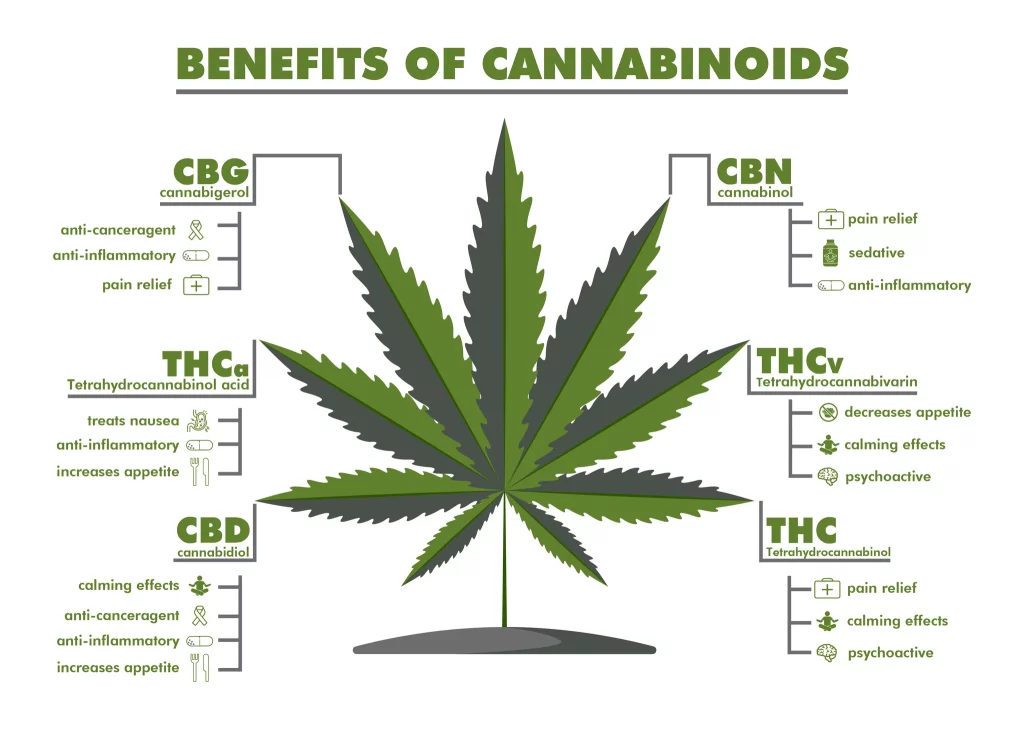Cannabinoids are compounds found in the cannabis plant. Until recently, not a lot was known about their benefits to humans.
What Are Cannabinoids?
Cannabinoids are naturally occurring compounds found in the cannabis plant. These unique substances have sparked significant interest in both the medical and recreational realms for their versatile properties. From alleviating chronic pain to enhancing relaxation, cannabinoids play a pivotal role in shaping the cannabis experience.
Among the most recognized cannabinoids are tetrahydrocannabinol (THC), cannabidiol (CBD), cannabigerol (CBG), cannabichromene (CBC), tetrahydrocannabivarin (THCV), and cannabinol (CBN).
Understanding Cannabinoids
Cannabinoids can be grouped into three main categories:
- Endocannabinoids: Naturally produced by the human body to regulate and maintain internal balance.
- Phytocannabinoids: Found in the cannabis plant, these include well-known compounds like THC and CBD.
- Synthetic Cannabinoids: Lab-created compounds that mimic natural cannabinoids, often used in pharmaceuticals.
The Endocannabinoid System
At the core of how cannabinoids affect us is the endocannabinoid system (ECS), a sophisticated and dynamic network that plays a crucial role in maintaining homeostasis within the body. This intricate system comprises cannabinoid receptors, endocannabinoids (naturally occurring compounds in the body that mimic cannabinoids), and enzymes responsible for synthesizing and breaking down these compounds.
The ECS is vital for regulating critical functions such as mood, pain perception, appetite, sleep, memory, and immune response. Its influence extends to nearly every physiological system, acting as a bridge between the body and the brain to promote balance and optimal functioning.
The two primary cannabinoid receptors, CB1 and CB2, have distinct roles and locations:
- CB1 receptors are predominantly found in the brain and central nervous system, where they influence neurological processes like mood regulation, memory, and motor control. These receptors are responsible for the psychoactive effects associated with THC, as the compound binds to CB1 receptors to produce euphoria and altered perception.
- CB2 receptors are more prevalent in the immune system and peripheral organs, where they modulate inflammation and immune responses. This makes CB2 receptors a key target for cannabinoids like CBD, which are valued for their anti-inflammatory and therapeutic effects without producing a high.
Interestingly, the ECS is not exclusive to humans; it is found in all vertebrates, highlighting its evolutionary importance. This universal presence underscores the adaptability and essential nature of the ECS in maintaining internal stability.
Emerging research reveals that the ECS may be involved in even more complex processes, such as regulating gut health, cardiovascular function, and stress resilience. Scientists continue to explore how cannabinoids interact with this system to unlock their full therapeutic potential, paving the way for new medical treatments and a deeper understanding of human physiology.
THC: The Psychedelic Pioneer
Tetrahydrocannabinol (THC) stands as the most recognized cannabinoid, celebrated for its psychoactive properties that induce euphoria and enhance sensory perception. It is this unique characteristic that has positioned THC as both a cultural icon and a cornerstone of cannabis research.
Medical Benefits of THC
- Chronic Pain Management – Effective in alleviating chronic pain, especially for conditions resistant to conventional treatments.
- Appetite Stimulation – Vital for individuals undergoing chemotherapy or living with HIV/AIDS, helping maintain a healthy weight and combat appetite loss.
- Nausea and Vomiting Relief – Highly effective in reducing nausea and vomiting, offering crucial support for patients dealing with side effects of intensive medical treatments.
- Neuroprotective Potential – Early studies indicate benefits in managing neurological conditions such as multiple sclerosis and Parkinson’s disease.
- Mental Health Support – Can reduce symptoms of PTSD and anxiety when used thoughtfully and in appropriate dosages.
For many recreational users, THC provides a gateway to altered states of consciousness, encouraging relaxation, creativity, and a sense of well-being. These effects can foster social connection and contribute to its popularity across diverse cultures and settings.
CBD: The Therapeutic Powerhouse
Cannabidiol, or CBD, stands out as a non-psychoactive cannabinoid, meaning it doesn’t produce the “high” typically associated with THC. This distinct quality makes CBD an appealing option for a variety of therapeutic applications, offering a natural alternative for those seeking relief from physical and mental health challenges without altered perception.
Health Benefits of CBD
CBD’s versatility stems from its ability to interact with the endocannabinoid system (ECS) in ways that promote balance and well-being. Its benefits span a range of conditions and wellness goals:
- Anxiety and Depression – Research and anecdotal reports alike highlight CBD’s ability to reduce symptoms of anxiety and depression, fostering a sense of calm and emotional stability. Many users appreciate its gentle yet effective support for managing stress in everyday life.
- Epilepsy: – CBD’s efficacy in treating seizures is perhaps its most well-documented application, with the FDA approving Epidiolex, a CBD-based medication, for severe conditions like Dravet syndrome and Lennox-Gastaut syndrome. This breakthrough underscores CBD’s potential to transform lives.
- Chronic Pain and Inflammation – Whether it’s joint discomfort from arthritis or muscle soreness from daily wear and tear, CBD’s anti-inflammatory properties make it a natural ally for pain relief. Its ability to target inflammation at the root of the issue provides a comprehensive approach to healing.
- Skin Disorders – CBD is increasingly popular in skincare products for its ability to regulate sebum production and soothe inflammation, making it an effective treatment for acne and other skin irritations. Its antioxidant properties further enhance skin health, promoting a more radiant complexion.
CBD is widely regarded as well-tolerated, with a low potential for side effects. This gentle profile makes it suitable for long-term use in most cases, though individual responses may vary. It’s important to approach CBD use mindfully, especially if you’re taking other medications, as interactions are possible. Consulting a healthcare provider ensures a personalized approach tailored to your needs and goals.
CBG: The Emerging Star
Cannabigerol (CBG), often called the “mother of all cannabinoids,” is a non-psychoactive compound that serves as a precursor to other major cannabinoids, such as THC and CBD. During the cannabis plant’s growth, most CBG is converted into these other cannabinoids, leaving only trace amounts in the mature plant. This scarcity has made CBG a relatively lesser-known compound until recently, but its unique and powerful therapeutic potential has captured the attention of researchers and medical professionals alike.
Health Benefits of CBG
- Anti-Inflammatory – CBG demonstrates potent anti-inflammatory properties, making it a valuable tool in managing conditions characterized by chronic inflammation. Early studies suggest its effectiveness in treating inflammatory bowel disease (IBD) and other gastrointestinal disorders, where it helps reduce inflammation without the harsh side effects associated with traditional medications.
- Pain Relief – As a natural analgesic, CBG interacts with the ECS to alleviate pain. Its ability to influence the body’s perception of pain positions it as a promising alternative to opioids, offering a safer and non-addictive option for individuals suffering from chronic pain conditions such as arthritis or migraines.
- Antimicrobial – CBG has shown remarkable antimicrobial activity, particularly against drug-resistant bacteria like MRSA (methicillin-resistant Staphylococcus aureus). This positions it as a potential breakthrough in combating antibiotic-resistant infections, an area of growing concern in modern medicine.
- Neuroprotective – CBG’s neuroprotective properties have sparked interest in its potential to treat neurodegenerative diseases such as Huntington’s, Parkinson’s, and Alzheimer’s. Research indicates that CBG may help protect nerve cells from damage and support overall brain health by reducing oxidative stress and inflammation in the nervous system.
- Cancer Treatment – Preliminary studies suggest that CBG may inhibit the growth of certain cancer cells, particularly in aggressive forms of cancer like colorectal cancer. Researchers believe it works by interacting with specific receptors involved in tumor progression and blocking cancer cell proliferation. While these findings are still in their early stages, they highlight the need for further research into CBG’s potential as a cancer-fighting agent.
CBC: A Silent Game-Changer
Cannabichromene (CBC), often overshadowed by its more famous counterparts like THC and CBD, is quietly earning its place in the spotlight as a cannabinoid with remarkable therapeutic potential. Unlike THC, CBC is non-psychoactive, meaning it doesn’t produce a high. This makes it an attractive option for those seeking therapeutic benefits without the mind-altering effects typically associated with cannabis.
Health Benefits of CBC
- Anti-Inflammatory and Pain Relief – One of CBC’s standout qualities is its ability to reduce inflammation and alleviate pain. Studies suggest that CBC interacts with receptors outside the ECS, such as the transient receptor potential (TRP) channels, which are involved in pain perception and inflammation. By targeting these channels, CBC can provide significant relief for conditions like arthritis, muscle soreness, and other inflammatory disorders. Its anti-inflammatory properties also make it a potential adjunct in treating autoimmune diseases.
- Neuroprotective Properties – Research indicates that CBC may play a role in promoting brain health and repair. It encourages the growth of new brain cells—a process known as neurogenesis—particularly in the hippocampus, a region of the brain associated with memory and learning. This property positions CBC as a promising candidate for managing neurodegenerative conditions such as Alzheimer’s disease, Parkinson’s disease, and other cognitive disorders.
- Antimicrobial Potential – CBC also shows promise as an antimicrobial agent, with studies revealing its effectiveness against a range of bacteria and fungi, including strains resistant to conventional antibiotics. This potential makes it an exciting focus for future research into combating antibiotic-resistant infections.
- Synergy with Other Cannabinoids – Perhaps one of CBC’s most fascinating attributes is its ability to work synergistically with other cannabinoids. Known as the entourage effect, this phenomenon occurs when cannabinoids, terpenes, and other compounds in cannabis enhance each other’s therapeutic effects. For instance, CBC has been shown to amplify the anti-inflammatory effects of THC and CBD, making it a key player in full-spectrum cannabis products designed for maximum therapeutic benefit.
With its diverse range of benefits and potential to enhance the efficacy of other cannabinoids, CBC is no longer just an understudy in the world of cannabis—it’s a silent game-changer ready to take center stage.
THCV: A Unique Cannabinoid with Metabolic Potential
Tetrahydrocannabivarin (THCV) stands out among cannabinoids due to its distinctive psychoactive and therapeutic profile. While THCV is psychoactive at higher doses, its effects are markedly different from those of THC. Rather than inducing a strong euphoric high, THCV delivers a clearer, more focused experience with fewer sedative properties. This has earned it the nickname “diet weed” among enthusiasts, highlighting its unique metabolic properties.
Health Benefits of THCV
- Weight Loss and Metabolism Boost – One of THCV’s most intriguing benefits is its potential for weight management. Unlike THC, which can stimulate appetite (the infamous “munchies”), THCV suppresses hunger by antagonizing CB1 receptors in the brain at low doses. This effect not only helps curb excessive food intake but also boosts metabolism, making it an exciting candidate for addressing obesity and other metabolic disorders.
- Blood Sugar Regulation and Diabetes Management – THCV shows significant promise in managing blood sugar levels and improving insulin sensitivity. Early studies suggest that THCV can reduce fasting blood glucose levels and improve glucose tolerance, positioning it as a potential therapeutic option for Type 2 diabetes. Its ability to support metabolic health while reducing appetite could revolutionize how we approach weight-related health conditions.
- Anxiety and PTSD Relief – Unlike THC, which can sometimes exacerbate anxiety, THCV has shown an ability to reduce symptoms of anxiety and post-traumatic stress disorder (PTSD). Its interaction with CB1 and CB2 receptors helps regulate stress responses and promote emotional stability. For individuals struggling with these conditions, THCV offers a non-intoxicating option that provides relief without compromising mental clarity.
- Neuroprotective Properties – Emerging research suggests that THCV may also have neuroprotective benefits, protecting brain cells from damage and degeneration. This opens doors for its potential use in treating neurodegenerative diseases such as Parkinson’s and Alzheimer’s.
As cannabis science evolves, THCV is poised to become a key player in targeted therapies for metabolic disorders, mental health conditions, and beyond. Its unique profile exemplifies the versatility of cannabinoids, showcasing how these compounds can address diverse health challenges in innovative ways.
CBN: The Sleep Specialist
Cannabinol (CBN), a cannabinoid derived from the natural degradation of THC, is gaining recognition as a specialist in promoting restful sleep. While it has mild psychoactive properties, these effects are significantly subdued compared to THC, making it an attractive option for individuals seeking relaxation without a pronounced “high.”
Health Benefits
- Sleep Aid: A Natural Solution for Restful Sleep
CBN is often dubbed the “sleep cannabinoid” for its ability to promote deep and restorative sleep. Its sedative properties make it particularly appealing for individuals struggling with insomnia or irregular sleep patterns. Unlike traditional sleep aids, CBN offers a natural alternative with fewer risks of dependency or grogginess the next day. - Pain Relief and Anti-Inflammatory: Double Duty for Comfort
CBN exhibits a powerful combination of analgesic and anti-inflammatory properties. This makes it effective for managing chronic pain conditions such as arthritis or fibromyalgia. By targeting inflammation at its source, CBN not only reduces discomfort but also addresses one of the root causes of many pain-related conditions. - Neuroprotective Potential: Early Hope for Complex Conditions
Preliminary studies suggest that CBN may have neuroprotective properties, showing promise in the management of neurodegenerative diseases such as ALS, Parkinson’s, and Alzheimer’s. While research is still in its infancy, these findings open the door to potential breakthroughs in how cannabinoids can support brain health and cognitive function.
The Future of Cannabinoids
Cannabinoids represent a frontier of therapeutic potential. From managing chronic conditions to enhancing overall well-being, their benefits are vast and varied. With continued research and advancements in personalized medicine, cannabinoids may soon offer tailored solutions to meet individual needs. Whether exploring the psychoactive effects of THC or the therapeutic power of CBD, cannabinoids hold the promise of a healthier future.

***
GreenPharms is more than just a dispensary. We are a family-owned and operated company that cultivates, processes, and sells high-quality cannabis products in Arizona. Whether you are looking for medical or recreational marijuana, we have something for everyone. From flower, edibles, concentrates, and topicals, to accessories, apparel, and education, we offer a wide range of marijuana strains, products and services to suit your needs and preferences. Our friendly and knowledgeable staff are always ready to assist you and answer any questions you may have. Visit our dispensaries in Mesa and Flagstaff, or shop online and get your order delivered to your door. At GreenPharms, we are cultivating a different kind of care.
Follow us on social media






